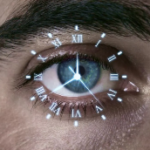Eyes And Aging
As You Age, Make Vision A Health Priority
As you age, it is normal to notice changes in your vision. Vision changes can make it difficult to perform everyday activities, such as reading, walking safely,taking medications, performing self-care and household tasks, and driving.
Some changes are normal. These changes include the following:
• Losing focus, making it harder to focus vision up close.
• Having trouble distinguishing colors, such as blue from black, or where an object ends and its background begins.
• Needing more light to see well and more time to adjust to changing levels of light (e.g.,
• going from a room that is dark to one that is brightly lit).
These changes do not have to stop you from enjoying an active lifestyle or maintaining your
independence. These vision changes can often be corrected with the following:
• Glasses
• Contact lenses
• Improved lighting
Vision loss is not a normal part of aging
But, as you get older, you are at higher risk of developing
the following age-related eye diseases and conditions that can lead to vision loss or blindness:
• Age-related macular degeneration
• Cataract
• Diabetic retinopathy
• Glaucoma
In their early stages, these diseases often have no warning signs or symptoms. The only way to detect them before they cause vision loss or blindness is through a comprehensive dilated eye exam. During a comprehensive dilated eye exam, your eye care doctor at Ophthalmic Consultants of the Capital Region will put drops in your eyes to dilate, or widen, the pupils. We will use a special magnifying lens to examine your eyes to look for signs of eye disease.
There Are Other Things You Can Do To Protect Your Vision
• Stop smoking.
• Eat a diet rich in green, leafy vegetables and fish.
• Exercise.
• Maintain normal blood pressure.
• Control diabetes (if you have it).
• Wear sunglasses and a brimmed hat any time you are outside in bright sunshine.
• Wear protective eyewear when working around your house or playing sports.

